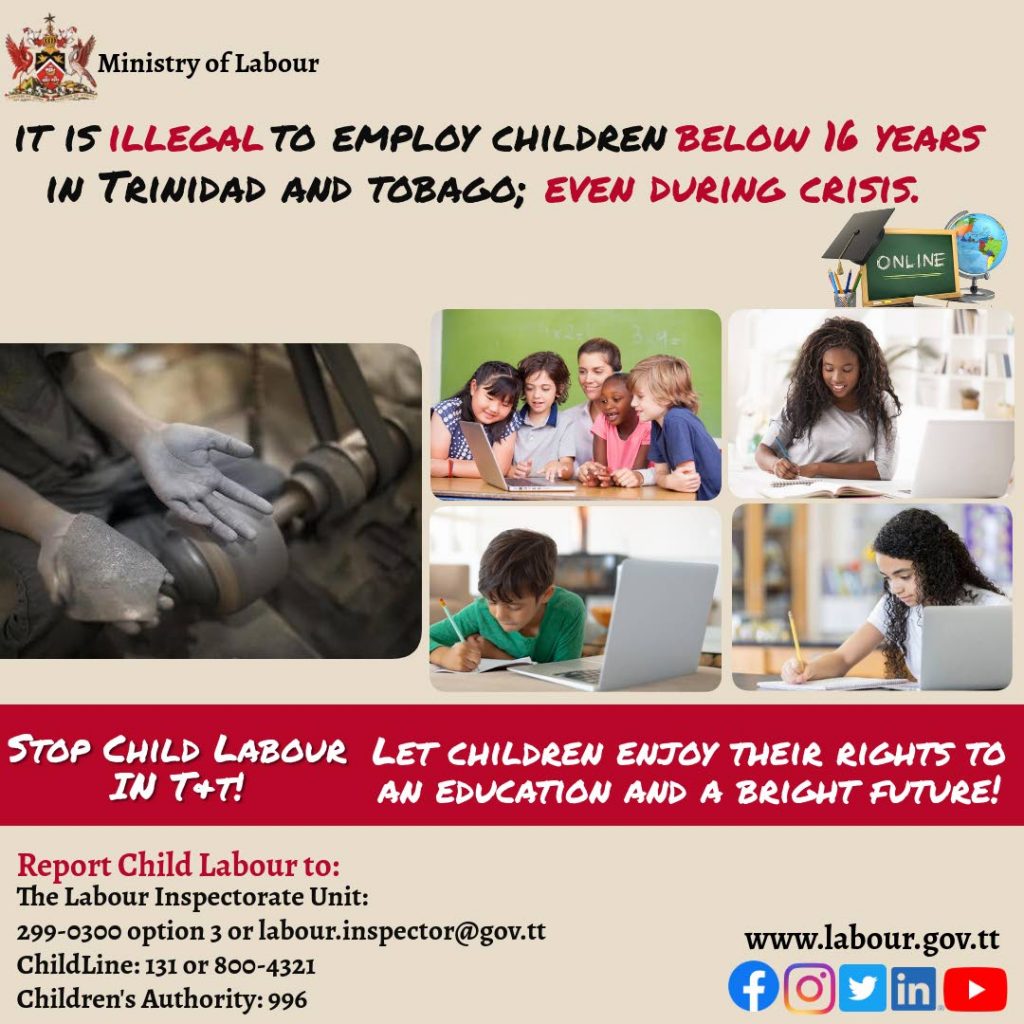Lack of resources to monitor child labour, says labour minister

THE true status of child labour in TT is unknown and this is owing to a lack of resources, said Minister of Labour Stephen McClashie.
As the international community observed World Day against Child Labour on Saturday, he told Newsday that the ministry was unable to monitor and safeguard children against exploitation.
“We rely on people reporting the possible incidents of child labour. We do not have the budget or the people to go out into the communities and to look and to interrogate businesses to identify whether there is child labour taking place.
“Once it is reported to the labour inspectorate, their officers will go out and investigate the complaint. But it is not a proactive thing that we go out there looking for it.”
With the covid19 pandemic forcing increased unemployment and restructuring of the school system into an online platform, the International Labour Organisation (ILO) said children were at greater risk of facing circumstances that were more difficult.
Its latest global estimates said 152 million children – 64 million girls and 88 million boys – were involved in child labour, accounting for almost one in ten of all children worldwide.
The ILO also noted that 73 million children were working in hazardous conditions directly endangering their health, safety, and moral development.
McClashie said our population was unable to identify child labour because not all work performed by children was considered child labour.
He said with covid19 forcing families to find alternative means of income it was difficult to determine if the child was working or helping his or her parents.
Using the example of a child selling mangoes at the side of the road, McClashie said “It was okay for a child to help, but when the child is unable to participate in online learning, which deprives the child of an education, it then contradicts with the United Nations rights of the child.”
The ILO defines child labour as work that is mentally, physically, socially or morally dangerous and harmful to children and interferes with their schooling by depriving them of the opportunity to attend school.
It added that some activities such as helping around the home and assisting in a family business were not considered child labour, as it can contribute to children’s development and to the welfare of their families.
“It can provide them with skills and experience which can help to prepare them to be productive members of society during their adult life.”
Social activist and research officer at the University of the West Indies Institute of Gender and Development Studies Marcus Kissoon said it was unfortunate that the ministry placed emphasis on public reporting.
He said such reactive approaches would have detrimental implications on children, families and society.
“We have to be wary about this culture of reporting incidents and being the only way to understand the reality of child labour in this country. Children would be reluctant to make reports of ill-treatment.
“We have to be very careful about the dependence of reports. Resources need to be put out there where we can engage in a collection of evidence to enact change,” Kissoon said.
Kissoon added that child sexual labour continued to be of great concern for TT, as recent statistics showed 17 per cent of migrant children were involved in sexual labour.
“In the recent documenting of migrants, 17 per cent, that is a little under 3,000 were children involved in sexual exploitation. In our culture and society children are at risk of sexual labour and exploitation. We see it in reports from police raids which show girls from as young as 14 years were held.”
The Children’s Act part 16, Section 105 which address employment of young people states that “a child under the age of 16 years shall not be employed or work in any public or private undertaking, or in any branch thereof, other than an undertaking, owned and controlled by members of the same family.”
It also states that parents and employers can be fined up to $25,000 – and three-years' imprisonment if found guilty of child labour.


Comments
"Lack of resources to monitor child labour, says labour minister"